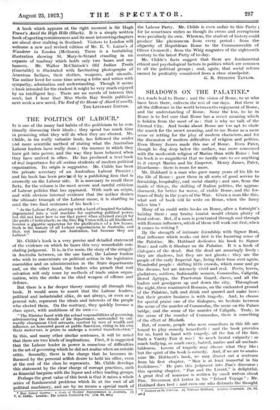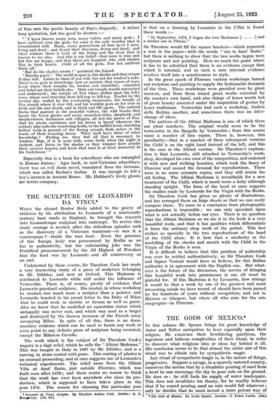SHADOWS ON THE PALATINE.
ALL roads lead to Rome : and the vision of Rome, to us who have been there, enlivens the rest of our days. But there is all the difference in the world between the enjoyment of Rome, and the understanding of Rome. None the less, to be in Rome is to feel sure that Rome has a secret meaning which is hidden from the most of us : that is why we talk of the Eternal City. And books about Rome are too apt to elude the search for the secret meaning, and to use Rome as a mere scene or setting for the play of modern characters, and for the discussion of modern difficulties of religion and politics. Even Henry James made this use of Rome. Even Pater, though he dug deep below the surface, was more concerned with the modernish religion of Marius than with Rome : but his book is so magnificent that we hardly care to see anything in it except Marius and. his Emperor. Henry James, Pater, Hawthorne—there is room for more.
Mr. Hubbard is a man who gave many years of his life to the life of Rome : gave them- in all sorts of good service to friendship, hospitality, and social charity : and saw, from the inside of things, the shifting of Italian politics, the aggran- disement, for better for worse, of visible Rome, and the for- tunes of Italy in the years of the War. Given a man like this, what sort of book will he write on Rome, when the fancy takes him ?
Many of us could write books on Rome, after a fortnight's holiday there : any brainy tourist would obtain plenty of local colour. But, if a man is penetrated through and through with Roman influences, which of them will work out first, when it comes to writing ?
By the strength of intimate friendship with Signor Boni, that influence which works out first is the haunting sense of the Palatine. Mr. Hubbard dedicates his book to Signor Boni : and calls it Shadows on the Palatine. It is a book of dialogues of the dead. But the dead are amazingly lively : they are shadows, but they arc not ghosts : they are the people of the early Imperial Age, living their time over again. Wonderful people : shifting little crowds, which come and go like dreams, but arc intensely vivid and real. Poets, lovers, gladiators, soldiers, fashionable women, Commodus, C,aligulit, Herod Agrippa, the Praetorian Guard, slaves, and all the loafers and gossippers up and down the city. Throughout the night,these reanimated Romans, on the enchanted ground of the Palatine, talk and drink and quarrel and make love : but their greater business is with tragedy. And, to choose for special praise one of the dialogues, we hesitate between the scene of the murder of Commodus, the scene on the Palace bridge, and the scene of the murder of Caligula. Truly, in the scene of the murder of Commodus, there is something of the effect of Macbeth.
But, of course, people who were comedians in this life are bound to play comedy henceforth : and the book provides for us, hand in hand with tragedy, all the fun of the fair. Such a Vanity Fair it was! So much brutal vulgarity : so much bullying, so much envy, hatred, malice and all unchari- tableness. Lovers of tragedy may choose what they like : but the spirit of the book is comedy. And, if we are to anato- mize Mr. Hubbard's book, we may dissect out a sentence from his first chapter, "Man is at least immortal in his foolishness." • He puts this judgment into Pan's discourse : this opening chapter, "Pan and the Lizard," is delightful. A great deal of nonsense is written by small writers about Pan. Stevenson did better in his "Inland Voyage " : Mr. Hubbard does best : and even one who distrusts the thought • How Labour Governs : a Stodp of Workers' Representation in Australia. ny • Shadows on the Pala:ins. By WIlfranc Hubbard. London: Conetable. pa. 64.
of Pan sees the poetic beauty of Pan's rhapsody. A rather long quotation, but too good to shorten :—
" ' I have known many men, many rulers, and many gods ; I have outlived even the gods, for mine is the only worship that is remembered still. Many, many generations of men have I seen, living and dead ; and heard their discourse, living and dead ; and what wisdom there is both of the living and the dead that is known to me also. And this is my belief—that none is wise and but few are happy, and that those are happiest who still cherish Pan in their hearts. Child of all the gods, Pan has outlived them all.'
But do the shades return ? ' persisted the Lizard. Mundus patet ! The world is open to the shades and they return if they will. Listen to them if you will, but not for wisdom's sake. There is no gain in knowledge, new or ancient, that comes of man. Look where their temples lie, broken and crumbled ; crumbled and faded are their beliefs also. Only one temple stands untouched and undecayed ; the temple of Pan whose arches span the lofty trees, whose roof stretches from hill-top to hill-top. Roofed by the eternal sky, walled by the everlasting mountains, the temple of Pan stands where it ever did, and his worship goes on for ever in birth and life and death, and in birth and life again. The ordered flocks that pasture in the peaceful valleys, the wild beasts that haunt the forest glades and rocky mountain-sides, shepherds and shepherdesses, huntsmen and villagers, all feel the power of Pan. And his praise continues and his hymn is heard wherever the solitary pipe calls the wandering herds, or the baffled lover, clutching hollow reeds in pursuit of the fleeing nymph, finds solace in the music of their moaning stems. What need have these of other knowledge ? Feeling me, they feel all that is necessary to wisdbm. But, if it is your wish, come forth when the night is darkest, and listen to the shades as they whisper here amidst their ancient haunts, and learn that man is at least immortal in his foolishness.'"
Especially this is a book for schoolboys who are entangled in Roman history. Ages back, in mid-Victorian schooldays, there was an evil sham novel, translated from the German, which was called Becker's Gallus. It was enough to kill a boy's interest in Ancient Rome. Mr. Hubbard's lively ghosts are better company.



































 Previous page
Previous page